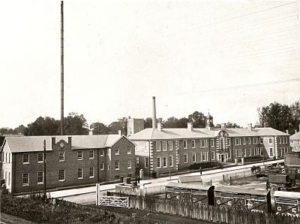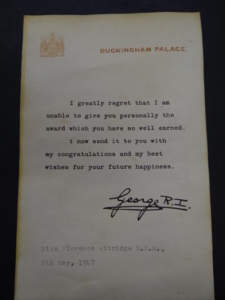Florence Attridge
Radio Technician
Photograph of Florence Attridge as a young woman (Image courtesy of Tim Wander)
- BORN 14th June 1901, Chelmsford, Essex
- DIED 1975, Chelmsford, Essex
- WORKED Marconi New Street Works, Chelmsford
- HONOURS Awarded British Empire Medal in 1946 for secret wartime defence work
- MINERVA SCIENTIFICA PROJECT Echoes from Essex 2020
(Images of Attridge’s medals courtesy of Tim Wander)
Entry by Dr Patricia Fara, Emeritus Fellow of Clare College Cambridge and member of the British Society for the History of Science.
Artistic Connections
None recorded
Music
Title: Thinking I Hear Thee Call
Composer: CHERYL FRANCES-HOAD
Scientist: Florence Attridge
Text: by Frances M Lynch, incorporating British Type 3 Mark II Spy Radio manual
For: Soprano and Speaker
Performed by: electric voice theatre singers Frances M Lynch (Soprano – Florence Attridge) and Margaret Cameron (Speaker – Spy)
First performed: Online during the Covid-19 pandemic, Aug 24th 2020 as part of the “Echoes from Essex” project
“Thinking I Hear Thee Call” by Cheryl Frances-Hoad is inspired by the life of Florence Attridge, an Essex woman who, whilst working at the Marconi factory in Chelmsford during WWII, helped to make secret radio sets for spys. In this piece for soprano, speaker and electronics, we hear Florence recount her experiences, whilst, in another, secret location, in another time, a spy goes through the radio’s (complicated!) set up instructions one last time before going on their first reconnaissance mission. The electronic element takes sounds that are associated with Florence’s life and the history of Marconi, including morse code and “Absent”, the first song to be broadcast from the factory. The text for Florence’s part was written by Frances M Lynch based on research by Patricia Fara, and the speakers text comes from the official manual for the The British Type 3 Mark II Spy Radio.
The performers recorded their parts individually in their homes and the final work was combined with the composer’s electronic track and produced by Frances M Lynch & Herbie Clarke at Birnam Studios, London.
“Thinking I Hear Thee Call” by Cheryl Frances-Hoad was commissioned by electric voice theatre. The project was supported by the Arts Council Emergency Response Fund (National Lottery). Cheryl Frances-Hoad is supported by PRS Foundation’s The Open Fund for Music Creators.
Title: The March of the Women
Music by: Ethel Smyth (1858 –1944)
Arranged by: Frances M Lynch
Words by: Cicely Hamilton
For: 4 female voices
Film by: Jack Cornell
Performed by: Frances M Lynch
Florence Attridge spent her whole career with Marconi, winning a British Empire Medal after the Second World War for her classified contributions to developing radio spy sets. This film celebrates her life and those of the thousands of women who contributed to the war efforts of the 20th century.
Education
Unknown, but it was then compulsory to attend school until the age of 12.
Occupations
After the First World War, she worked for many years at Marconi, but probably left in 1950 when she married for the first time.

Women workers at Marconi New Street winding shop, c.1922 (Image courtesy of Tim Wander and the Marconi Company Archive)
Scientific Achievement
Technicians are crucial for scientific research. She was in charge of the coil-winding department, so was a highly skilled manual worker involved in developing radio communication technology
Did You Know?
Paradoxically, because her wartime work was secret, it’s impossible to know exactly what she contributed, but she played an important role in developing spy sets and decoding equipment for the Special Operations Executive.
An Inspiring Woman
She excelled at the meticulous intricate work that made radio communication possible. Women who work behind the scenes are often overlooked, but their role is crucial. Appointed a manager, she must also have shown high administrative skills.








